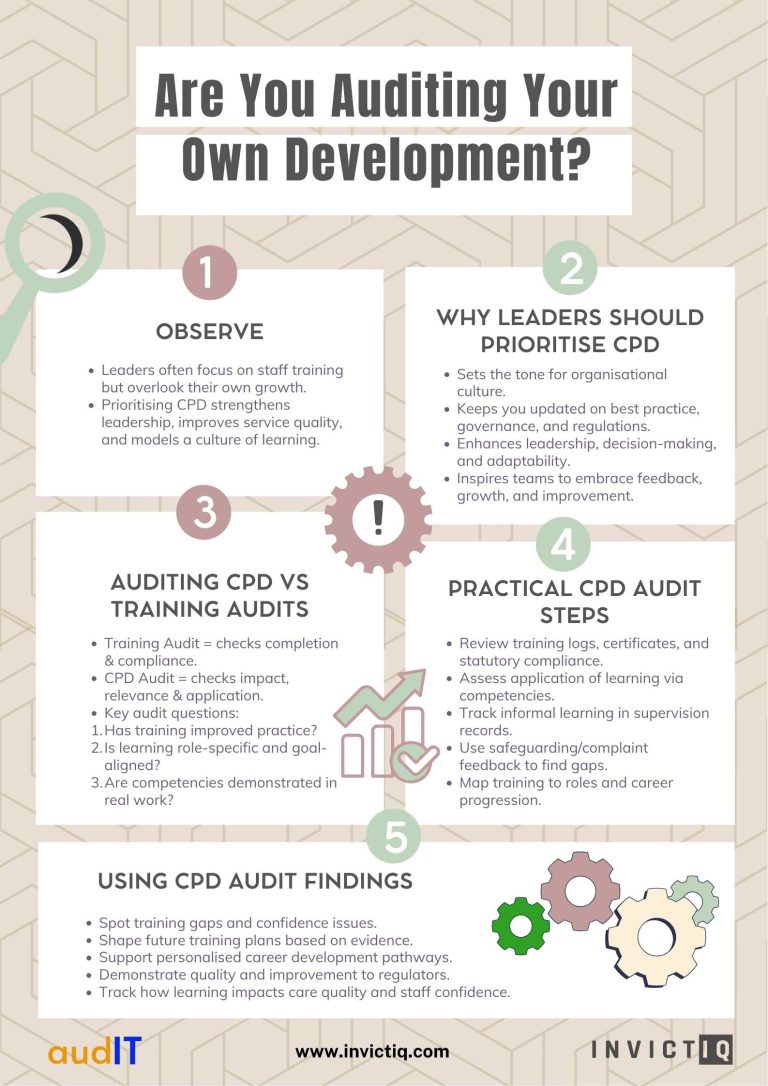@2021 invictIQ is a venture by Sprint Consultancy. All rights reserved. Privacy Policy.

You audit everything, but are you auditing your own development?
by Mark Topps
There is so much emphasis on upskilling our workforce, which I completely understand and agree with, but all too often there is less focus on the development of our Registered Managers, Operational and Regional Managers. In this blog, I want to explore why us leaders should be prioritising our own professional growth and how in turn this will enhance our leadership, improve service delivery and also touch on how we can utilise audits to ensure compliance around personal development.
Why you should be prioritising your CPD
As a leader within your team, your own development sets the tone for the culture you create. Investing in your Continuous Professional Development keeps you informed of best practices, regulatory changes, good governance and enhances your leadership and decision making skills. Not only does it allow you to stay at the top of your game, it also allows you to model a culture of learning and growth where your team can see their manager setting learning goals and reflecting on their development and this message confirms the culture of how learning is valued. Organisations whose managers are reflective and adaptive have teams that feel open to feedback, curious to drive positive change and a proactive attitude toward improvement
Auditing CPD
As a manager in social care there are 101 audits you have to complete, but auditing CPD is often missed but can easily be built into your training audit. Auditing CPD records isn’t about oversight on training compliance, but about ensuring that learning is meaningful, relevant and aligned with organisation and individual’s goals. Here’s my experience of CPD audits:
- Reviewing training logs and certificates to ensure each staff member has up to date records of completed training and verifying compliance with statutory and regulatory standards (e.g., safeguarding, health and safety, medication management) – your typical training audit.
- Looking beyond attendance to assess how training has been applied in practice and this is where competencies play a huge role. It’s not enough to attend a course, your team members should be able to demonstrate the skills and knowledge gained.
- Ensuring CPD is ongoing and tailored to the individual’s role, responsibilities and career path. This means tracking not just mandatory training but also development activities like mentoring, shadowing webinars and reflective practice.
Remember, a traditional training audit focuses on completion (who did what, when and whether it meets compliance standards). A CPD audit, however, explores impact and relevance. It asks:
- Has the training improved practice?
- Is the learning aligned with the staff member’s role and future goals?
- Are there gaps between training delivered and competencies demonstrated?
This deep dive will help you move from compliance to quality improvement.
Practical tips to identify CPD from day-to-day operations
- Use supervision records to capture informal learning and reflections. Remember, your team will tell you what training they found useful, what they need more of and where they feel underprepared.
- Use feedback from safeguarding concerns or complaints to identify training gaps. Effective root cause analysis will really pick this up
- Track competency assessments alongside training records to see if learning has translated into practice.
- Encourage staff to maintain CPD portfolios that include formal training, informal learning and reflective notes.
- Map training to role specific competencies to ensure relevance and progression.
Once you’ve audited CPD records, use the findings to:
- Identify training gaps or areas where staff lack confidence or competence?
- Shape future training plans and align learning opportunities with company needs and staff feedback.
- Support career development by using your CPD audit insights to guide conversations about progression and personalised learning pathways.
- Demonstrate quality to regulators using your new CPD audit as this will evidence a commitment to continuous improvement and workforce development.
- Track how training influences performance, confidence and the quality of care being provided.
In social care, where the pace is relentless and the stakes are high, it’s easy for leaders to put their own development on the back burner. But prioritising your CPD isn’t just about personal growth, it’s about setting the standard for your team, driving service improvement and ensuring compliance and knowledge. By embedding CPD audits into your routine, listening to staff feedback and using insights to shape meaningful training plans, you create a culture where learning is continuous, purposeful and impactful. Audit on Cloud Communications Module by InvictIQ further strengthens this by collecting and analysing employee feedback using AI, ensuring that valuable insights are not missed and trends are identified early. Alongside this, the Audit module offers leaders an efficient way to structure, track and evidence compliance activities with confidence.
If you do anything today, it should be to take a moment to reflect: are you investing in your own development as much as you invest in others?
MORE ARTICLES

Mark Topps is a social care leader who has worked in the care industry since 2004 and is currently working as a regional support manager. He regularly advocates, appearing on television, radio and podcasts and has started many campaigns for change in legislation and culture within the industry. Mark is the co-founder of The Caring View which is a social care podcast, YouTube show and free resource initiative for the sector. He also co-founded The Health and Social Care Club, which is an audio event hosted on LinkedIn. Mark is also the social media and marketing director at the National Association of Care and Support Workers.
Sign up for our newsletter

